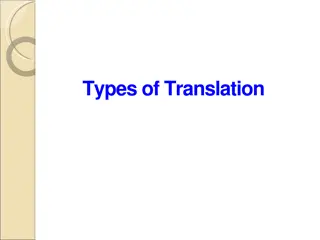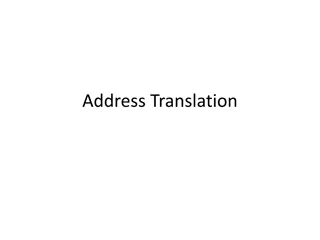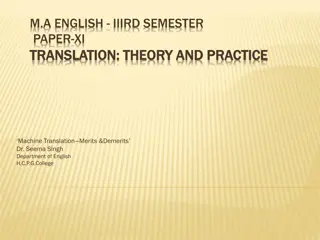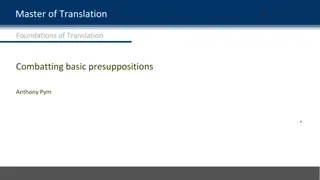Understanding the Translation of Verb "To Be" and "Have
Exploring the complexities of translating verbs "to be" and "have" in different contexts, whether as an auxiliary or main verb, with examples and solutions to common translation problems faced by students. The importance of accurately conveying meanings with these verbs is highlighted through practical scenarios.
Download Presentation

Please find below an Image/Link to download the presentation.
The content on the website is provided AS IS for your information and personal use only. It may not be sold, licensed, or shared on other websites without obtaining consent from the author. Download presentation by click this link. If you encounter any issues during the download, it is possible that the publisher has removed the file from their server.
E N D
Presentation Transcript
VERB TO BE : ( ) ) ( . 1 : The manager is absent today. .
: . 2 Egypt is the heart of the Arab nation. .
to be . ) ( . 3 What logic is. . Democracy is a corner stone in our world today. . The wedding was last week. . .
concern : International Amnesty Organization raised its concern at the UNHRC, particularly at the situation snowballed. We certainly concerned for the safety of the civilians caught in the crossfire between the insurgents and government forces. Their safety should be the concern of all nations of the world. . .
. 1 Inmates were beaten by the prison guards. . . : . 2 His father was killed in the war. / : He died last night. .
Translation of Verb Have The verb Have (i.e. have, has, had) is used both as an auxiliary and a main verb. As an auxiliary, it is not so problematic. However, as a main verb, it can pose a few problems to the students of translation.
Translation of Verb Have Problem 1 and solution: Have as an auxiliary: Verb have is used as an auxiliary to perform important grammatical functions with regard to tenses in particular. In this case, it is meaningless in Arabic, and you can simply ignore it altogether and translate the tenses according to the rules that you have already learned. The workers have left early today. . The patient has had the medicine. ) . (
Translation of Verb Have Problem 2: Have as a main verb: different meanings: Many students translate have into one version only, that is: ( ), when it is the main verb of the sentence. This is only one of its several meanings, and students are advised to be careful at translating it.
Translation of Verb Have Solution: students should understand have as a verb of several meanings. Here they are: 1. she has money. / / / / ) ( (all these translations are possible, but the last one may be the most common, while the first one could be the least common.) 2. she has her breakfast at 7 o clock everyday. .
Translation of Verb Have 3. She has the tablets on time. ) . 4. She has just had the ticket. . 5. She had a telephone call this morning. ) . 6. She has to speak two languages. . ( ) ( (
Translation of Verb Have 7. She had a nice holiday. . 8. Have a good journey. . 9. Have a bash. . / / What helped students distinguish between these meanings of have is the consideration of the word immediately after it (i.e. its object). Together with its object, have make a special combination in Arabic (i.e. collocation). For instance, although we can say or , etc. , we cannot say
Revision Translate the following: You have to study now. She has a beautiful house. Have a nice weekend. My friend s father was killed in the war. There is a pen on the desk. A knife is for cutting. Sugar is an important source of energy. The contract was signed by the two parties. My dress was made in Italy. Rice is grown in India.
Phrasal verb a phrasal verb is a combination of verb and one or more adverbs or prepositions, as catch on, take off, or put up with, functioning as a single semantic unit and often having an idiomatic meaning not predictable from the meanings of the individual parts.
Phrasal Verb Meaning(s) Example Bring about Cause a speech that brought about a change in public opinion. Bring up Raise children *She brought up five children. Mention/introduce a topic *bring it up at the meeting Call back Return a telephone call I ll call you back. Call off Cancel The game was called off because of bad weather. Call on Visit *Let's call on Mrs. Franklin this afternoon. *The teacher called on me, but I was not ready to recite. Ask a student to answer a question in class
Call up Call on the telephone I called him up to ask if he was free for lunch. Check in Register The airline requires you to check in at least an hour before your flight. Check into Investigate I don't know when they open but I'll check into it. Check out Borrow a book from the library *If you don't finish that book before the library closes, you will have to check it out. * It's something we all have to be concerned with. Check it out. Investigate Drop by Visit Be sure to drop by the next time you're in the area.
Drop in (on) Visit informally *We'll drop in and see how you're doing tomorrow. *Should we drop in on our neighbors tonight? Drop off Leave something for someone You left your jacket, but I can drop it off on my way to work tomorrow. Take someone or something to a particular place I m about to leave. Can I drop you off somewhere on my way home? Get along (with) To have a good relationship Do you think the cats and dogs will get along if we put them in a cage together? Those two just don't get along. Get back (from) Return from somewhere What time did you get back last night? Get off Leave any vehicle Let's get off the train at the next stop.
Get in Enter a car We opened the door of the car and got in. Get on Enter any vehicle The bus stopped, and I got on. It took me a week to get through the book. Get through Finish Get up Arise from bed, a chair, etc. Return something to someone I usually get up early. Give back Could you give me my pen back? Give up Stop doing something She didn t give up work when she had a baby. Hand in Submit an assignment I forgot to hand in my test paper.
Hang up Stop a telephone conversation *Please hang up the phone. Put clothes on a hook or hanger *Please hang your jacket up in the closet. Keep out (of) Not enter The lid keeps the flies out of the jar. Keep up (with) Stay at the same position of level Don't work so fast. I can't keep up with you. Look after Take care of Please look after my little boy. I'll have to look into that matter. Look into Investigate
Look out (for) Be careful If you don't look out, you could fall on the ice. Look up Look for information I forgot her phone number, so I looked it up on the Internet. His aunt passed away last month. Pass away Die Pass out Distribute *Please pass these out to everyone. *When he got the news, he passed out. Faint - lose consciousness Pick out Select We went to the video store and picked out a movie to watch. Please come to my office and pick me up at noon. Pick up Go to get someone
Put off Postpone I have to put off our meeting until a later time. Put on Get dressed Don't forget to put on a warm coat. Put out Extinguish a fire He put out the fire with flour. Put up with Tolerate I will not put up with your bad behaviour any longer! Run into Meet by chance We ran into some old friends at the store. Run across Find by chance He ran across her name in the phone book. Run out (of) Finish a supply of something I think we've run out of toothpaste.
Take after Resemble She takes after her grandfather in her talent for design. Take off Remove clothing *She took her coat off. Leave on a trip * We took off for Moscow early in the evening. Leave the ground *The plane took off on time. Take over Take control The new manager will take the office over next week. Take up Begin a new activity When did you take this hobby up?
Turn down Decrease volume Please turn the radio down. Turn in Submit work (class work) *I turned my application in before the deadline. *I turned in early last night. Go to bed Turn off Stop a machine, equipment, light, etc. Turn the TV off. Turn on Start a machine, equipment, light, etc. Turn on the light. Turn out Extinguish a light I turned the light out. Turn up Increase volume Turn up the radio, please.
Revision Fill in the blanks using the following verbs in the appropriate form: drop by Pass out Put out check in I entered the hotel, went to the registration desk, and______. If you still have questions on the material, why don't you______ my office sometime, and we'll go over everything step by step. ______these papers to everyone. ______that fire now, before it goes out of control. 1. 2. 3. 4.
Translate the following: The meeting was called off. When did you take this hobby up? I have to put off our meeting until a later time. Let's call on Mrs. Franklin today.

























